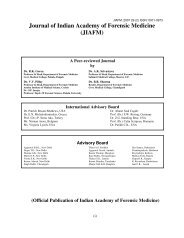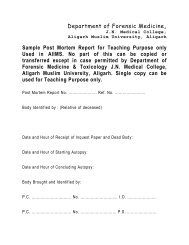Download - forensic medicine
Download - forensic medicine
Download - forensic medicine
Create successful ePaper yourself
Turn your PDF publications into a flip-book with our unique Google optimized e-Paper software.
JIAFM, 2007 - 29(4); ISSN: 0971-0973<br />
Section 164A Criminal Procedure Code has been<br />
added by Amendment Act 2005 to provide for a<br />
medical examination of a rape victim by doctor<br />
employed in government hospital and in absence of<br />
such, victim can be examined by any other private<br />
doctor whose name is entered in the state medical<br />
register.<br />
The legislature brought about an amendment in by<br />
Act 4 of 2003 (sec. 3) by inserting a proviso to<br />
section 146 of the Indian Evidence Act 1872 that in a<br />
prosecution for rape it shall not be permissible to put<br />
questions in the cross-examination of the victim with<br />
respect to her moral character. This led to the<br />
deletion of the section 155 (4) of the Indian Evidence<br />
Act in 2003, whereby the ‘generally immoral<br />
character’ of the victim cannot be a ground raised by<br />
the accused for rape.<br />
Duty of doctor in rape cases:<br />
Examination of the rape victim should be carried out<br />
as early as possible without any delay with consent<br />
preferably by a lady doctor as per the s. 164A CrPC<br />
which is binding force on the doctors.<br />
History taking in the case of medicolegal reports<br />
especially rape cases should be avoided. It is a<br />
means of harassment for causing humiliation to the<br />
victim of crime. A victim of rape has already<br />
undergone a traumatic experience and if she is<br />
made to repeat again and again in unfamiliar<br />
surroundings what she had been subjected to, she<br />
may be too ashamed and even nervous or confused<br />
to speak and her silence or a confused stray<br />
sentence may be wrongly interpreted by the court as<br />
discrepancies and contradictions in her evidence.[5]<br />
In a case in Delhi High Court [6] it was submitted<br />
that even in the MLC it is recorded that according to<br />
the victim ‘somebody’ raped her and there is no<br />
mention of the accused. The document was<br />
prepared by a doctor who may or may not have<br />
found it necessary to mention the name of the<br />
alleged rapist particularly since he was the<br />
stepfather of the victim. In the same case doctor did<br />
not notice any bloodstains on the victim’s clothes,<br />
but the Investigating Officer did notice and this<br />
discrepancy cropped up in the case.<br />
The doctor shall forward the report without delay to<br />
the Investigating Officer noting the exact time of<br />
commencement and completion of the<br />
examination.[7] However in the famous Mattoo case<br />
[8] the parcel of clothes of the victim, the vaginal<br />
swabs and the slides as per post mortem report<br />
were handed over the Inspector Lalit Mohan on 25-<br />
1-1996 after the conclusion of post-mortem. The<br />
report was definite and categorical about handing<br />
over of the articles on 25-1-1996. However in the<br />
court, police deposed that the said parcels were<br />
collected from the doctors on 29-1-1996. There is no<br />
explanation as to what happened or in whose<br />
possession the articles were from 25-1-1996 to 29-<br />
1-1996 and so the possibility of tampering with the<br />
articles could not be ruled out. The findings of the<br />
trial court acquitting the accused were justified. It is<br />
the duty of the doctors and the police to maintain the<br />
chain of custody in such cases. In this case the trail<br />
court has rejected the DNA test and the found the<br />
doctor Dr.G.V.Rao of CCMB Hyderabad not to be a<br />
trustworthy witness.<br />
It has been repeatedly held by the Supreme Court<br />
that the name of the rape victim should not be<br />
disclosed. Mentioning the name of the victim in any<br />
publication, paper, book, giving news item in press<br />
conference by the doctor; is not only contrary to the<br />
views expressed the Supreme Court but also<br />
contrary to the statutory law under s.228A Indian<br />
Penal Code which makes it punishable with<br />
imprisonment for two years and fine. However it has<br />
been seen that author of book like Textbook of<br />
Forensic Medicine and Toxicology – Principles and<br />
Practice [9] is not conscious of the amendment or do<br />
not realize its importance in showing the face and<br />
genital area in photos with name and address thus<br />
disclosing the identity of the victim of sexual offence.<br />
In view of writ petition [10] before the High Court, in<br />
case of victim of sexual offences, the publication of<br />
photographs of such victims in newspapers, journals<br />
and magazines would fall under category of making<br />
disclosure of identity of victim and thereby such act<br />
would fall under s. 228A IPC. Circular dated 15-7-<br />
2002 issued by Director General of Police to stop<br />
permitting women victims of violation being<br />
photographed. The High Court has taken a serious<br />
view of the matter, and has ordered it to be<br />
implemented by all the police officials in letter and<br />
spirit; so that the guilty may be brought to the book.<br />
There have been instances [11] where the Courts<br />
have set aside the conviction and acquitted the<br />
accused, solely on the ground that the victim was<br />
medically examined but the doctor who examined<br />
her did not come in the witness box to prove the<br />
report and the prosecution did not take care to<br />
examine the lady doctor. Even serologist report was<br />
on the record but the same was not proved. The<br />
High Court was of the opinion that non-examination<br />
of the doctor and non-providing of an opportunity to<br />
the accused person to cross examine the lady<br />
doctor is a fatal one and is a great lacuna in the<br />
prosecution case. On the basis of this view the High<br />
Court acquitted the accused on benefit of doubt.<br />
As per the Section 204 Criminal Procedure Code,<br />
regarding attendance of the witness, in event of noncompliance<br />
with the process, it would be the<br />
functioning of the court to compel attendance of the<br />
doctor. As per Constitution of India, Article 21,<br />
109


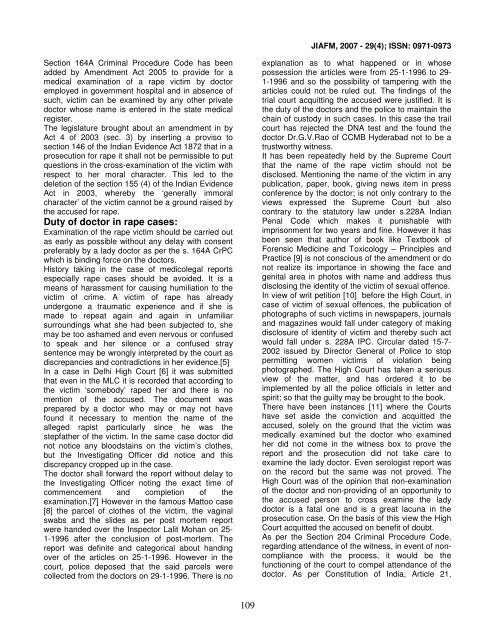
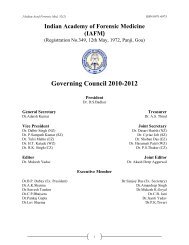
![syllabus in forensic medicine for m.b.b.s. students in india [pdf]](https://img.yumpu.com/48405011/1/190x245/syllabus-in-forensic-medicine-for-mbbs-students-in-india-pdf.jpg?quality=85)
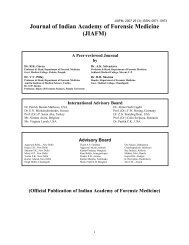
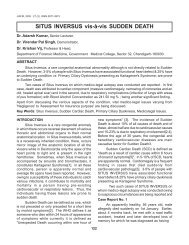
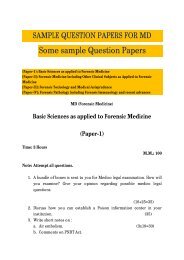
![SPOTTING IN FORENSIC MEDICINE [pdf]](https://img.yumpu.com/45856557/1/190x245/spotting-in-forensic-medicine-pdf.jpg?quality=85)
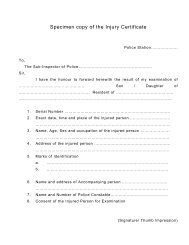
![JAFM-33-2, April-June, 2011 [PDF] - forensic medicine](https://img.yumpu.com/43461356/1/190x245/jafm-33-2-april-june-2011-pdf-forensic-medicine.jpg?quality=85)
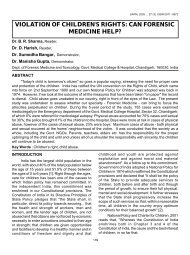
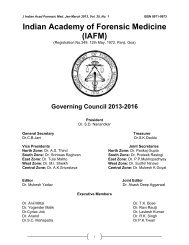
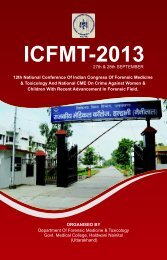
![JIAFM-33-4, October-December, 2011 [PDF] - forensic medicine](https://img.yumpu.com/31013278/1/190x245/jiafm-33-4-october-december-2011-pdf-forensic-medicine.jpg?quality=85)
